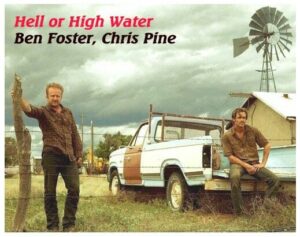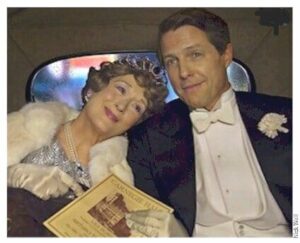Two of the films opening Friday might be said to be an early kick off of the time of year when the studios release the “big guns,” films they hope attract award nominations. These two, Hell or High Water, an off-beat indie, and Florence Foster Jenkins, surely will.
Oscar winner (Crazy Heart) Jeff Bridges (The Big Lebowski, True Grit remake, Starman) is back and giving one of his best performances ever, as a crusty, sarcastic, and foul-mouthed Texas Ranger in Hell or High Water, a modern Western that adds family conflict and surprising twists to the old cops and robbers genre. Three-time Oscar winner and indefatigable Oscar nominee [19] Meryl Streep is back, as engaging as ever – maybe even more so, as the socialite who lived for music but who couldn’t sing – even with Hugh Grant lovingly by her side [while keeping another “side” on the side] in the entertaining, but much too short, biopic Florence Foster Jenkins.
Hell or High Water (CBS Films; 102 minutes) is a sort of back-handed homage to the infamous James Brothers and Robin Hood legend with a Bonnie and Clyde shoot-out that will long be remembered. It’s set in sun-roasted, deceptively sleepy West Texas town that feels dustily authentic [except that the film was shot in New Mexico] where the distinction between honest men and outlaws is often blurred beyond recognition. It’s definitely blurred here.
It co-stars straight out of the galaxies of the Star Trek franchise Chris Pine (Into the Woods) and Ben Foster (3:10 To Yuma, The Messenger) in roles that’ll keep their names on audience’s lips for some time.
There’s also film veteran Gil Birmingham (TV’s Unbreakable Kimmy Schmidt and House of Cards; The Lone Ranger, Twilight), in undoubtedly the best role of his career. Though unbilled in the opening credits, veteran Texan stage and screen actress Margaret Bowman, has a steal-the-movie cameo as a no-nonsense waitress – in a bit reminiscent of the diner scene in Five Easy Pieces, that’s been generating buzz since Cannes.
Hell or High Water, probably the sleeper film of the year, is from a superb original screenplay by actor [he has a cameo as a cowboy] Taylor Sheridan (Sicario script; actor, TV’s Sons of Anarchy, Veronica Mars; upcoming directorial debut, Wind River) and directed by Scotsman David Mackenzie (Young Adam, Starred Up).
This is one of those films that grabs you at the very beginning and never lets you snooze or run up the aisle for popcorn. Hell or High Water is a collision of the Old and New West. It approaches hit-movie-status in how it’s told.
Two brothers – Pine, a straight-living good ol’ boy, divorced father trying to make a better life for his son; and Foster, a hot-headed, just-released con with a loose trigger finger and revenge on his mind – become inept bank robbers of branch after branch of the bank that brought their mother to destitution and an early death and which is about to foreclose on their land. Of course, the bank’s been withholding a secret: the farm is a virtual Saudi-like oil reservoir.
In the tradition of Robin Hood to the rescue, these modern-day cowboys become bank robbers. The stick-ups are part of “an intended non-violent last-ditch scheme to take back a future that powerful forces beyond their control have stolen.” But when revenge leads to murder, the brothers find themselves in the crosshairs of relentless “weathered as an old fencepost, creaky as a front-porch floor” Texas Ranger Bridges, who’s within hours of retirement age and wants his last rodeo to be consigning the thieving varmints to Death Row if it’s the last thing he does. And it almost is.
In spite of the clock ticking away to high noon, he sets about doing it the old-fashioned way – by the book and the law-and-order code he’s lived by, with his put-upon Indian side-kick, Birmingham.
There’s an adrenalin-laced shootout worthy of one at the OK Corral only with getaway cars [which they have an ingenious way of getting rid of] instead of horses, and assault rifles replacing six-shooters. Though pumped with 21st Century armour and a swat team, in the end it’s the trusty old Winchester that ends the day in semi-triumph. Then comes the twist you don’t see coming and ultimate showdown.
Hell Or High Water has been called “a cinematic cousin of sorts” to the Coen brothers’ No Country for Old Men, “because it’s equally mellow and raging at the state of the world.” However, with Bridges constant racial teasing slurs and dark humor, the film goes way beyond that with Sheridan’s stellar character study of the Texas Ranger and the brothers. And when they rob banks, you know where the audience sympathy lies.
Bridges says he’s long been a fan of Westerns. “My father [Lloyd Bridges] did some terrific Westerns, including High Noon. Whenever he did one, I loved getting into his costume and walk around in his boots and hat. I’ve also made Westerns. I read Taylor’s script and it rang true. It was written by a guy who knew what he was talking about. Then I found out his uncle is a Texas marshal.”
He admits he didn’t know much about the Texas Rangers “In preparation, I read [S.C. Gwynne’s] Empire of the Summer Moon: Quanah Parker and the Rise and Fall of the Comanches, the Most Powerful Indian Tribe in American History about the last great Comanche Indian chief [Parker] and the beginning of the Texas Rangers.”
To help Bridges and Birmingham bond, director Mackenzie suggested that they tool around in their patrol car and “just jam. That led to a very long improvisation. He shot two or three hours. We had a ball, but very little’s in the movie. That was a valuable way to get into the characters.”
For almost 40 years, Meryl Streep has portrayed an astonishing array of characters in a career that, sadly, cut short her theatrical ambitions but blazed a path of incredible artistry in film/TV. She’s won three Oscars from a total of 19 nominations [the most for any actress/actor], 28 Golden Globe nods with eight wins, and two Emmys.
Many consider her “the greatest living actress.” In her return to serious film roles, after Ricki and the Flash and what amounted to a cameo in Suffragette, headlining the biopic Florence Foster Jenkins (Paramount/Pathe/BBC Films; 100 minutes), her performance as “the world’s worst singer” should add a few more honors.
Helming the production is three-time Oscar nominee Stephen Frears (The Queen, Philomena, My Beautiful Laundrette). The film returns Hugh Grant to the screen as the aristocratic but not so highly regarded British Shakespearean actor St. Clair Bayfield [a co-founder of Actors Equity] as FFJ’s manager/protector and second husband.
Though his journals, housed at the New York Public Library for the Performing Arts, seem to claim they were actually in a “common law” relationship, theirs was a unique romance. He enjoyed the comforts FFJ’s money could buy, but he was singularly devoted to her, even if he had a woman on the side, and kept her living happily in the bubble of her deeply held delusions until … well, you’ll soon find out.
In the stellar featured role of FFJ’s accompanist Cosme McMoon, constantly making adjustments to compensate for her tempo variations and rhythmic mistakes, is film and TV star Simon Helberg, best known for 10 seasons on CBS’ mega hit The Big Bang Theory as Howard Wolowitz. Veteran Irish actor John Kavanagh has a couple of walk-ons as legendary conductor Toscanini who doesn’t mind being the recipient of FFJ’s largesse, but as evidenced by a very clever piece of dialogue re: attending one of her operatic soirees, isn’t about to encourage her folly.
Florence Foster Jenkins is based on the life of the 30s New York socialite, who died in 1944 at age 76. She had been a popular child prodigy pianist and it was a love of music that led her to follow her dream of becoming a singer. Sadly, though the spirit was willing, the vocal chords were not.
During WWII, New York audiences, including battalions of military, were thrilled to hear FFJ’s excruciatingly off-the-mark warbling. She was so enthusiastically generous that her loyal friends and beneficiaries were unwilling to tell her how horrible she was. A couple of the elderly rich in the film seem to be mesmerized by her calamitous arias – but, from the looks of them, they may be deaf. Though many ridiculed FFJ, others found what she did uplifting and she developed a huge cult following.
Because of complications from a social disease and the draconian treatments that followed, which caused progressive deterioration to her nervous system, what great vocalizations FFJ hears in her head is tuneless to the point of derision from others. St. Clair has found quite a comfortable niche for his talents, but his main job is to protect ailing Florence from the awful truth.
Cosme must accompany FFJ as if she’s Lily Pons. It’s not until she decides to rent Carnegie Hall for a recital that the public-at-large discover her lack of rhythm, pitch, and tone. But, as she tells St. Clair, she did play Carnegie Hall – and she got there by paying a lot of accomplices [a couple may surprise you] tons of money to lie.
In spite of the need for fine tuning, FFJ amazingly gained a huge cult following. Salon audiences at her tableaus in hotel ballrooms were struck by her sincerity and fearlessness and wowed by her ornate, self-designed costumes. Her intimate concerts of Verdi, Brahms, and such arias as Mozart’s “The Queen of the Night” from The Magic Flute and the “Indian Bell Song” from Lakme by Delibes, were must-hear/see events filled with celebrities and musical legends such as Pons, Caruso, and Cole Porter.
Streep, who was familiar with FFJ from hearing her best-selling [and still selling] record of swoops and hoots of arias that segued into descending trills, at drama school, says, “I saw Florence as a woman who was not only funny and vibrant but also powerful for her times. She joined and endowed dozens of clubs, even created one of her own. It was the era when professions weren’t open to women. To keep busy, women of means did charitable works. Florence was a philanthropist and great patron of the arts, which helped her move up the echelons of society.”
She often claims “I can’t sing that well,” but Streep is a trained vocalist who appeared as Hallelujah Lil in 1977’s short-lived English version Broadway revival of Weill-Brecht’s Happy End and won a 1981 Obie for Elizabeth Swados’ Alice in Concert at the Public, but she had to undo everything she knew to capture FFJ’s inimitable voice.
“I submersed myself in the details,” she explains. “I thought it would be a piece of cake, but it was much more difficult. Florence tackled some of the most difficult arias in the canon of operatic divas performances. For the Carnegie Hall sequence, we thrilled our captive audience with so much more than you hear in the film.” [Maybe the home entertainment release will have some of the unheard as bonus material.]
Streep worked with vocal coach Arthur Levy “in the art of almost good but definitively bad singing.” They started by doing the pieces properly, “then, we went off into the landscape of mistakes. I once heard Irving Berlin playing his music and singing along and he was wildly off pitch! That made me think that maybe there can be that disconnect even in some very accomplished musicians.”
As to why FFJ insisted on singing when she was making an impact on society in many other ways, Streep says, “That’s the mystery of the creative impulse, which can turn people into obsessives. Florence was a person who kept something we have as children: that quality where, even when you can’t do something well, you hurl yourself into the imagining of it and take delight in the doing. It’s the purest, most moving, meaning of the word amateur. She sang for her friends and hand-picked audiences — the exception being the Carnegie Hall performance. She loved music and I love the delight she took in it, and try to convey that in the film.”
If you saw the recent art house hit, the lavishly-produced Marguerite, starring acclaimed French star Catharine Frot as a fictional stand-in for FFJ, you’ll see Florence Foster Jenkins covers the same situation. However, Marguerite is more comedy while, thanks to Streep’s poignant portrayal, imbued with light-hearted absurdity and genuine tenderness.
Florence Foster Jenkins digs deeper [and could have dug even further] to add something movingly human beneath Florence’s urge to perform no matter the alien sounds she creates. She reinforces her understanding of FFJ’s psyche late in the film in quite a moving sequence with Helberg in his low-rent flat at the back of an alley.
Nothing was shot in New York. Frears claims, “You couldn’t make this film in New York. It doesn’t look like the 1940s anymore.” [Has he never visited the Lower East Side, East and West Greenwich Village, and luxe area of the Upper East Side ?]. Liverpool, interestingly, stood in for 40s New York. Standing in for Carnegie Hall was London’s Hammersmith Apollo Theatre, while New York salon sequences, such as those at the Ritz Carlton and former Commodore and Park Central, were re-created in the Art Deco ballroom of London’s Park Lane Hotel.
Florence Foster Jenkins lived in a world of opulent glamour and ostentatiousness even in time of war. Production designer Alan MacDonald was responsible for recreating her unique slice of Manhattan. Costumes are by Oscar nominee (The Queen) Consolata Boyle.
Meryl Streep, well-padded and with aging make-up and wigs, has found a crafty human side to FFJ and in Florence Foster Jenkins creates a comic but loving ode to creative inspiration and those long-lasting illusions of grandeur that joyously transcend reality.
Ellis Nassour is an Ole Miss alum and noted arts journalist and author who recently donated an ever-growing exhibition of performing arts history to the University of Mississippi. He is the author of the best-selling Patsy Cline biography, Honky Tonk Angel, as well as the hit musical revue, Always, Patsy Cline.
Follow HottyToddy.com on Instagram, Twitter and Snapchat @hottytoddynews. Like its Facebook page: If You Love Oxford and Ole Miss…







